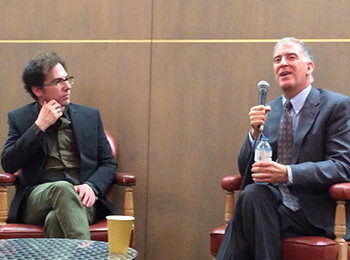TORONTO — As Rabbi Donniel Hartman reflected on his Zionist youth, he recalled that as a bar mitzvah boy he had “bought” a tree in Israel – or at least, a part of one.
The memory still brought a smile to his face. “What a beautiful idea,” he reminisced.
Today, however, it’s not enough to plant trees in Israel. “We have to plant ideas,” he said.
All Jews have a stake in the future of Israel, not just in the land but in its cultural values and principles, he said. We need to shift away from a longstanding focus on “continuity Zionism,” which was concerned with the survival of the Jewish People and the preservation of the State of Israel, and turn to support for “cultural Zionism.”
That’s an aspirational Zionism that seeks to make Israel not just a state of the Jews, but also a Jewish state, one imbued with Jewish ideals, Jewish principles, Jewish culture and a Jewish way of doing things. It is open, accepting, democratic and tolerant, he said.
Rabbi Hartman, president of the Jerusalem-based Shalom Hartman Institute, addressed the topic, “Talking about Israel, the need for a new conversation.”
At a community gathering sponsored by The CJN in association with the Shalom Hartman Institute and hosted by Beth Tzedec Congregation on April 27, he encouraged Diaspora Jews to make their voices heard and influence the discussion about the future of Zionism. Doing so is necessary to preserve Zionism’s appeal to future generations.
He said continuity Zionism makes no sense to young people in Canada and the United States. Their experience is not of rampant anti-Semitism, but of welcoming societies in which they feel safe, where intermarriage is high in the United States and growing in Canada, where Israel is more powerful than its enemies and where the Holocaust increasingly recedes into history.
An appeal to their Zionist sympathies based on concerns over the safety and security of the Jewish People will fall on deaf ears, Rabbi Hartman argued.
Instead, Jews must focus on a cultural renaissance in which Israel will nurture a democratic, pluralistic, tolerant and expansive version of Judaism, a “Judaism on steroids… the best of what we are.”
He said too many policies of the current government are influenced by concerns over security and “continuity Zionism.” He criticized the government for failing to welcome 50,000 African refugees, instead referring to them as infiltrators. He said such an attitude ignores Jewish tradition, which taught that all people are created in God’s image and that Jews were once strangers in Egypt.
He called on Israel to be “an exemplar of how you treat refugees.”
He said a Jewish state is obliged to pursue peace, even if there is no discernible peace partner.
“At least you keep it on the table. That’s what a Jewish state is about,” he said.
Rabbi Hartman asked an audience of 390 people to consider “how we, the lovers of Israel, create a future for the lovers of Israel.” Is the community laying a foundation so that in 20 years, the room in which he spoke will again be filled with lovers of Israel? For that to happen, he suggested, you have to give young people another reason beyond continuity Zionism, to support Israel.
Going back to the 19th century, he made a compelling case for Israel as a state for the Jews – a refuge from anti-Semitism and a place where Jews could live without discrimination.
However, there was an element within Zionism that did not see a state for the Jews as a goal in itself, he continued. “Jews never saw continuity as an end in itself. To be a Jew meant to strive for something.”
Cultural Zionism looked at ways Jews could be a holy people, as expressed at the national level. Their goal was to bring Jews together to create a cultural renaissance, a society worthy of the idea of Jews as a holy people, he said.
In their national home, Jews would take what is best from their own tradition, adapt influences from other civilizations, and become players on the international scene, not just spectators. In that way, they would become a light unto the nations, he said.
But in the aftermath of the Holocaust, continuity Zionism naturally took precedence. Over the years, weaknesses in that approach emerged. Palestinians ask why they should pay the price for Auschwitz, Rabbi Hartman said.
And for young Jews, continuity Zionism is “not coherent.” The legitimacy of Israel based on the Holocaust does not resonate.
Instead, an aspirational Zionism is the best way to gain support.
The greatness of life is not measured by what you achieve, Rabbi Hartman said, “but by what you yearn for.”
Others to address the event included Rabbi Baruch Frydman-Kohl, senior rabbi of Beth Tzedec Congregation, CJN president Elizabeth Wolfe, and DJ Schneeweiss, Israel’s consul general to Toronto and Western Canada. CJN editor Yoni Goldstein served as moderator of a question and answer session following Rabbi Hartman’s address.
